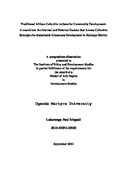| dc.description.abstract | Since the beginning of the new millennium, there are concerns about the wild spread poverty, underdevelopment and conflict especially in Africa. African governments, donors and development scholars have keenly paid attention to adopting and in some instances attempted to revamp traditional approaches as strategy for enhancing civic participation in development management and democratic processes at the grassroots level. However, despite such synergies not much is evident on the ground to transcribe that will. This study therefore, looked at the traditional African collective actions and their correlation with grassroots development. It particularly focused on the internal and external factors that motivate traditional African communities into collectivism in a search for sustainable grassroots development. In traditional Africa, sustainable social development bases on community capacity to uphold its value systems and ethically adapt exogenous development theories. Therefore, as society transcends into globalization and modernization it is vital to appreciate the contextual cultural realities and diversities as significant determinants of sustainable grassroots development.
From a social science and a traditional African theory standpoint sustainable grassroots development premises on social interconnectedness, trust, team work, and collective responsibility. These values constitute part of the traditional African education curriculum implementable at different stages of human development and socialization. Despite, the curriculum, African societies are influenced by Western perspectives of life and education that limitedly recognize the core values across traditional African social organization. To ascertain the internal and external factors linked to sustainable grassroots development, the research concentrated on three areas namely: the traditional African perception of collective actions, social capital and collective action, and the concept of sustainable development in the traditional African context. The results of this study not only anticipated to add to the already existing wealth of knowledge on the subject but also to provide an advocacy platform for development approaches that are contextually compatible and enhance equitable access, inclusiveness and challenged-driven.
This research employed qualitative open-ended interviews and quantitative questions. The key respondents included district and sub-county officials on the one hand and carefully selected community members. It involved conducting focus group discussions, structured and semi structured interviews, questionnaires and observations. These methods coupled enabled the study to establish data matched with the study objectives. | en_US |


